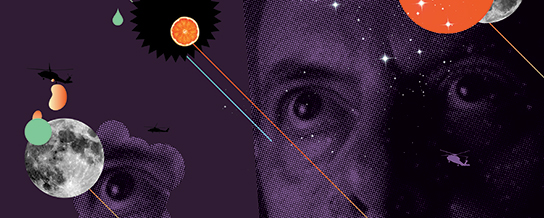Echoes of Karlheinz Stockhausen
“Whenever we hear sounds, we are changed.” – Karlheinz Stockhausen The validity of this simple […]

Echoes of Karlheinz Stockhausen
“Whenever we hear sounds, we are changed.” – Karlheinz Stockhausen The validity of this simple […]

“Whenever we hear sounds, we are changed.” – Karlheinz Stockhausen
The validity of this simple statement, when applied to the work of eclectic German composer and panoptic music visionary Karlheinz Stockhausen, who died last December at the age of 79, carries a profound resonance and clarity. After all, his philosophical approaches to composition, electronics, dub techniques, and musical theater have grown to become central themes in contemporary sound and music practice–even scoring him a spot on the cover of The Beatles’ Sgt. Pepper’s Lonely Hearts Club Band LP.
Arguably one of the most controversial figures interested in the exploration of “sound in space,” the mere mention of Stockhausen can polarize a room with amazing speed. At almost every level of his work (and life) Stockhausen created tension and flew in the face of accepted norms.
In music, his conceptual works challenged not only commissioning budgets, but also conventional taste and the very edge of countless musicians’ abilities and patience. Take the 1995 “classic” Helicopter String Quartet, in which each member of the quartet played their part of the score in isolation, listening to one another through headphones, whilst flying in their own chopper–certainly not the most carbon-friendly performance piece.
Equally as shocking, Stockhausen’s ill-articulated and ultimately misquoted comments about the “art” of the unfortunate happenings of 9/11 caused huge waves of discontent and unintended ramifications, from cancelled concerts to the eventual proclamation from his pianist daughter that she would no longer perform under her given name.
Ultimately, though, it’s his contribution to the reinvigoration and reconstruction of musical understanding that will leave an indelible mark on 20th-century sound culture. “I can’t think of another contemporary composer who has appeared in British sitcoms, been the bait to tempt people into at least acknowledging the avant-garde, and caused such a stir with both his music, words, and ideas,” comments U.K.-based composer and conceptualist Scanner. “In his exploratory work, [Stockhausen] crossed the lines between structuralism, tape cut-ups, electro-acoustic experiments, and ambitious dramatic theatrical presentations, foreshadowing many of the shapes and sounds we commonly experience today.”
His intensely methodical yet fanciful music drifted from post-serial-inspired works in the early ’50s through to expansive explorations into electronic sound (including the incredible “Gesang der Jünglinge” and “Kontakte”) and ultimately into opera–since 1978, Stockhausen spent much of his time working on the highly theatrical seven-phase operatic epic “Licht” (which, to this day, has yet to be performed in full).
For many, though, it’s his work in the 1950s and ’60s that solidified his place in sound culture. “When I hear early pieces,” U.S.-based sound artist Stephen Vitiello surmises of Stockhausen’s impact on sound, “especially ‘Kontakte,’ it’s hard not to be amazed at all that he was doing–and often before anyone else. With those pieces, I feel like he was the first person who really made electricity sing. It’s clear that he helped lay the groundwork for the future of electronic and experimental music.”
The question now, of course, is: Who will fill the ever-increasing musical and philosophical void?
Lawrence English is an Australian sound artist. He runs the Room40 label.

